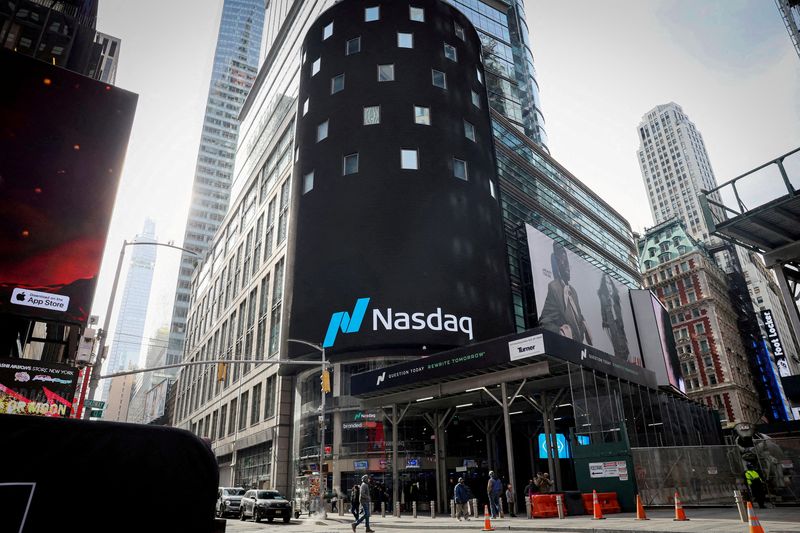By Lewis Krauskopf
NEW YORK (Reuters) - Investors are tiptoeing back into shares of U.S. tech stocks following a sharp tumble, even as some still-elevated valuations threaten to punish dip buyers if markets stumble again.
After a searing rally this year, the tech-heavy Nasdaq 100 is down more than 13% from an all-time high hit last month in a sell-off that has been blamed on everything from U.S. economic worries to the unwinding of a global yen-funded carry trade.
The sell-off has made tech stocks less expensive based on price-to-earnings ratios, boosting their allure to investors who had previously been reluctant to jump aboard. The S&P 500 tech sector recently traded at 26.1 times expected 12-month earnings estimates. That compares with 31.3 in July, which had been its highest level since 2002, according to LSEG Datastream.
Still, even bullish investors are proceeding with caution. While valuations have edged lower, the tech sector still trades well above its 10-year average of 20.7. Its 32% valuation premium over the broader S&P 500 is more than twice as wide as it has been over the last decade.
Those valuations could make the sector vulnerable to future turbulence. Mixed earnings from some of the biggest names - including Google parent Alphabet (NASDAQ:GOOGL) and Microsoft (NASDAQ:MSFT) - and legendary investor Warren Buffett’s Berkshire Hathaway (NYSE:BRKa) selling of half its Apple (NASDAQ:AAPL) stake are among other reasons traders are treading lightly.
"I'm not going all-in, but I've done some buying," said Robert Pavlik, senior portfolio manager at Dakota Wealth. He has started adding to some tech positions in recent days after paring holdings in companies including Nvidia (NASDAQ:NVDA), Broadcom (NASDAQ:AVGO) and Amazon.com (NASDAQ:AMZN) at the start of July.
"I don't think the outlook has changed for any of these companies,” he said.
Red flags for megacap stocks abounded last month: the technology sector reached its highest price-to-earnings ratio in more than two decades, while owning the "Magnificent 7" - the group of huge stocks including Nvidia and Apple - was deemed the most crowded trade for a 16th straight month, according to a BofA Global Research survey of fund managers.
When markets fell at the beginning of August, large tech and growth stocks were among the hardest hit. Since the Nasdaq 100's July peak, Nvidia has dropped almost 27%, Amazon has tumbled 18.5% and Alphabet has declined about 17%.
Some investors wasted little time in diving in. Global hedge funds went on their largest one-day buying spree in five months on Monday, in the midst of a sell-off in which the S&P 500 fell by as much as 4.25%, Goldman Sachs (NYSE:GS) said in a note to clients earlier this week. Most of the buying was concentrated in the tech sector, with semiconductors among the most popular sectors, according to the bank, which tracks the buying of its hedge-fund clients.
Despite the latest pullbacks, the Nasdaq 100 remains up 6% in 2024, while the S&P 500 is up 9%. Bulls can point to strong financial performance: with most companies already reported, two sectors that include a number of megacaps - tech and communication services - are on pace to increase second-quarter earnings by 19% and about 28%, respectively, from a year ago.
"There's stocks that we like, we think the earnings are going to hold up and valuations have improved," said Chuck Carlson, chief executive officer at Horizon Investment Services. "When you get that recipe, it's worth putting some money back in to them."
Carlson said his firm is considering whether to buy more shares of chipmakers Broadcom and Qualcomm (NASDAQ:QCOM) after the recent pullback.
Individually, some of the megacap names are trading below historical price-to-earnings averages, while others remain elevated. Facebook (NASDAQ:META) owner Meta Platforms, for example, is trading at 21.7 times, below its 10-year average of 25, while Microsoft is at 30 times, above its 10-year average of 25.
While economic worries have been components of the recent sell-off, investors could gravitate toward megacap tech stocks if those concerns persist, said Garrett Melson, portfolio strategist at Natixis Investment Managers Solutions.
The megacap companies' "bullet-proof" balance sheets and their ability to increase earnings even in rocky economic times have made them "the new, defensive safe havens" in many investors' eyes, Melson said.

To be sure, while markets have stabilized over the past two sessions, it remains to be seen if the recent bout of volatility is over. Uncertainty over the economic landscape will be tested in coming days, with weekly U.S. jobless claims on Thursday and the monthly consumer price index inflation data on Aug 14. As a result, some investors believe there may be better opportunities to buy tech stocks down the road.
"We encourage investors to use rallies in the market to sell part of their holdings in the tech and industrial sectors to raise cash and prepare for bumpy roads and better possible entry points," Michael Landsberg, chief investment officer of Landsberg Bennett Private Wealth Management, said in a written commentary.